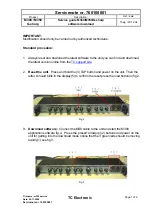
— 34 —
program, although it will definitely erase longer-term level vari-
ations in a hurry.
Some settings might allow AGC action to be audible in speech,
during a talk-show segment for example, but not during musi-
cal programming. You might want to experiment with various
AGC rates using program material representative of your for-
mat. The default settings work quite well in most situations.
STEREO ENHANCEMENT
The DAVID IV has a twin-action stereo enhancer with provision
to turn the enhancement effects on and off, plus two sliders
that control action of this feature. The front-panel OLED actu-
ally depicts the action of these features graphically, as will be
shown below.
Stereo Width
The
Stereo Width
: slider increases the perceived width of the
soundstage, which is the area between the listener’s left and
right loudspeakers. Increasing
Stereo Width
: will make the ste-
reo ‘wider,’ exaggerating the stereo effect even to the point of
its appearing to extend outside the confines of the normal
soundstage; that is, to the left of the left speaker and to the
right of the right one.
As the control is advanced, the front-
panel OLED graphic display will high-
light an area outside the normal
soundstage as shown here. The
shaded area, as well as the number shown below it, is some-
what arbitrary, serving only to illustrate what’s intended and to
give a number for setup reference.
Stereo-width growth is active only on stereophonic program
material, it does not imply any sort of stereo synthesis from a
monaural source.
Solo Width
The
Solo Width
: slider, on the other hand, acts only on center-
channel (monaural) program components.
Contemporary music is typically recorded in very sterile multi-
track sessions. Generally, each instrument has its own micro-
phone (or several!), and these mic channels are recorded as in-
dividual monaural tracks. In post-production, the recording
engineer, under the skilled and unquestionable guidance of the
session’s Producer, uses a ‘pan pot’ to place each track some-
where between full-left and full-right, essentially creating a
pseudo-stereophonic soundstage, or sound field. Vocal solos
are almost always panned dead-center, just like the talent mic
in the radio studio.
As Solo Width processing is introduced and increased, the cen-
tered vocalist (and on-air talent) will appear to ‘spread’ across
the soundstage. This is illustrated on the front-panel display as















































